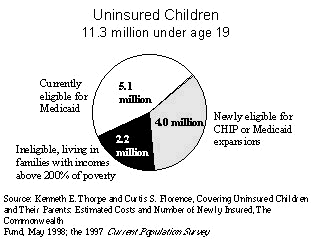As of July 17, half of states have federally approved Child Health Insurance Programs (CHIP). The next challenge will be to enroll all eligible children in the program, which, combined with Medicaid, could reduce the number of uninsured children by 80 percent. The Commonwealth Fund-supported report, Covering Uninsured Children and Their Parents: Estimated Costs and Number of Newly Insured, by Kenneth Thorpe and Curtis Florence, found that more than 9 million of the 11.3 million children under age 19 who do not have health insurance are eligible for coverage under one of the two programs.
 Thorpe and Florence, both of Tulane University, point out that 5.1 million poor or near-poor children nationwide are already eligible for coverage under Medicaid. An additional 4 million are eligible under CHIP, which was enacted last year to provide health care coverage to children in families with incomes below 200 percent of the federal poverty level. As state policymakers design programs to take advantage of $24 billion in new CHIP funds, they will need to focus on the next crucial phase¾ identifying and signing up eligible children.
"CHIP is the most significant opportunity since the Medicaid expansions of the 1980s to reverse the trend of declining health insurance coverage for the most vulnerable in our society -- children living in low-income families," said Karen Davis, president of The Commonwealth Fund. "The new legislation, however, was just a first step. States must now aggressively and creatively find ways of reaching out to families of eligible children to ensure that CHIP achieves its goal."
Lack of Insurance A Family Problem
Thorpe and Florence, both of Tulane University, point out that 5.1 million poor or near-poor children nationwide are already eligible for coverage under Medicaid. An additional 4 million are eligible under CHIP, which was enacted last year to provide health care coverage to children in families with incomes below 200 percent of the federal poverty level. As state policymakers design programs to take advantage of $24 billion in new CHIP funds, they will need to focus on the next crucial phase¾ identifying and signing up eligible children.
"CHIP is the most significant opportunity since the Medicaid expansions of the 1980s to reverse the trend of declining health insurance coverage for the most vulnerable in our society -- children living in low-income families," said Karen Davis, president of The Commonwealth Fund. "The new legislation, however, was just a first step. States must now aggressively and creatively find ways of reaching out to families of eligible children to ensure that CHIP achieves its goal."
Lack of Insurance A Family Problem
As states implement CHIP and expand Medicaid programs, the question of how to get their parents covered as well arises. Covering Uninsured Children and Their Parents finds that the large majority (80%) of parents of uninsured children are themselves uninsured. An estimated 6.6 million uninsured adults are parents of children who will be eligible under new CHIP rules or are already eligible for Medicaid (5.1 million), or are parents of children already enrolled in Medicaid (1.5 million). Most are working, but do not get affordable health insurance from their jobs—or do not get any health care coverage at all from their jobs.
Some states, such as Wisconsin, are considering implementing CHIP programs that would cover parents of eligible children. Federal legislative action to provide matching federal funds will likely be required to extend coverage to parents. Experts say that covering uninsured parents under CHIP could improve outreach efforts to children, coordination of family health care services, and family health.
"Many children's health problems are linked to their parents' problems—for example, smoking, unplanned pregnancy, depression, and chronic illness," noted Barry Zuckerman, M.D., medical director and chairman of the Department of Pediatrics at Boston City Hospital and co-director of the Fund's Healthy Steps curriculum and training. "If we're serious about improving child health we have to address their parents' health as well."
Outreach the Key to Success
Under CHIP, states have wide latitude in designing and implementing programs to reach targeted populations. Up to 10 percent of program funds may be used for outreach. So far, 25 states have had CHIP programs approved, and many are testing options to reach more people, including presumptive eligibility and 12-month coverage without requiring reapplication. Even as states undertake these efforts, however, the number of uninsured Americans continues to increase.
"It is alarming that while we are implementing CHIP, the number of uninsured children and families in this country continues to grow," said Joel Alpert, M.D., president-elect of the American Academy of Pediatrics. "The highest priority for the Academy is for all children -- and ultimately all Americans -- to have appropriate health care. States must start by focusing on implementing CHIP in the simplest and least bureaucratic manner. The job is not done until every American has coverage that allows access to needed health care."


